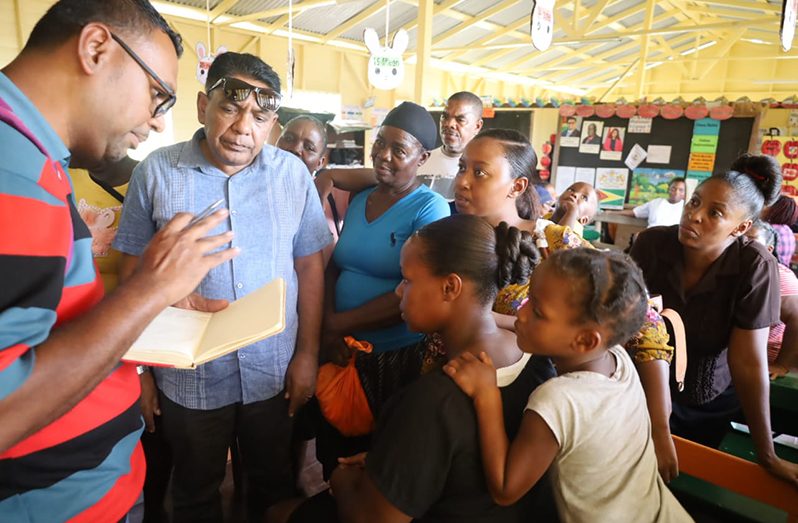–strategic plans being crafted for livestock, cash-crop production
WITH the aim of increasing agricultural production in Baracara, Region Six, two strategic plans will be developed to introduce sustainable practices in the riverine community’s livestock and cash-crop industries.
This was according to Agriculture Minister Zulfikar Mustapha, during an engagement with farmers at the community’s primary school on Friday.
During the meeting, several farmers raised concerns about the challenges they faced during the previous rainy seasons.
Roland Amsterdam, head of the farmer’s cooperative body, said that the high levels of rainfall and flooding have resulted in tremendous loss of crops and livestock and many are finding it difficult to recover.
“From the last meeting, we would have planted back, but the rain kept falling so scores of farmers are still suffering right about now,” Amsterdam said.
The man related that farmers are also in dire need of fertilizers in the community, noting that farmers are willing to work to increase production once support and inputs are provided.
Another farmer, Glendon La Fluer, said that livestock farmers have also suffered losses due to the recent weather conditions.
The man related that he and several other farmers want to move away from the traditional way of farming, and with the support, they believe sustainable practices could be adopted.
In response to the farmers, Mustapha said that the strategic plans will see the ministry working along with the community to adopt sustainable practices in food production, as well as in agro-processing.
“We have to change that kind of mechanism and that kind of thinking that we are just doing cash-crop farming, and as soon as we reap it from the farm and we take it to the market. What we have been doing, we have been building these agro-processing facilities so that we can add value to our produce,” Mustapha said, adding: “Rather than take the produce to the market we will package it and send it overseas; we will have for consumption here, but we will also get more money for you.”
In order for this to happen, the community must first decide which crops could be produced on a large scale.
It is for this reason that a team of technical officers from the National Agricultural Research and Extension institute (NAREI) will return to the community to conduct assessments and soil testing.
“We have to concentrate here on what we want to do in Canje Creek; what are the crops that we want to plant in large scale. I will be sending back a team from NAREI here and they will come and work with [you] and they will spend some time and some days; they will do some soil testing,” Mustapha said.
The community is known for its production in citrus, plantains, potatoes, eddoes and corn.
“I want to make this commitment when we decide on what type of crops that we will plant [whether] its plantain, corn or ground provision, we will supply all the planting materials,” Mustapha said.
As it relates to livestock, the minister has committed to providing the necessary inputs to the community.
Breeding bulls, boars and rams will be provided to the community. Additionally, a team from the Guyana Livestock Development Authority (GLDA) will also return to conduct assessments and craft its strategic plan.
“We will have to craft a livestock plan for this community, we have to see what exists and what is needed to move forward in the community,” the Agriculture Minister said.
Mustapha reminded the farmers that while Guyana has been receiving much buzz for its oil and gas sector, agriculture remains one of the country’s most vital and lucrative sectors; it is for this reason the ministry will continue to engage its stakeholders.
“Agriculture and the production of food is the most important thing for us; we can have all the oil and gas, and all the lumber, but if we don’t have food we cannot survive,” the Agriculture Minister said.




.jpg)










